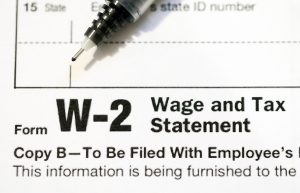 When you settle an employment law case, typically most or all of the money you receive will be taxable. Nonetheless, it is both common and important to discuss the tax allocation as part of the settlement negotiation, including what portion will be reported on an IRS form W-2, and what portion will be reported on a 1099.
When you settle an employment law case, typically most or all of the money you receive will be taxable. Nonetheless, it is both common and important to discuss the tax allocation as part of the settlement negotiation, including what portion will be reported on an IRS form W-2, and what portion will be reported on a 1099.
While I am an employment lawyer rather than a tax expert, below is my understanding regarding the taxability of employment law settlements under federal law. These issues can be complex and have significant consequences to you, so you should consult with a tax expert before you make any decisions.
W-2 Payments: Lost Wages
The portion of your settlement that is compensating you for lost past or future wages, severance pay, or other lost income should be treated as W-2 wages. That means it is subject to tax withholding, just like the wages you earned while you were employed. In addition, they are subject to federal payroll taxes, meaning Social Security, Medicare and Medicaid contributions, which combined equal 7.65% (with a cap on Social Security taxes).
1099 Payments: Emotional Distress, Medical Expenses, Punitive and Liquidated Damages
Any portion of the settlement of an employment law case that is intended to compensate you for emotional distress, pain and suffering and other similar harm, or to reimburse you for medical expenses, is taxable. However, it is subject to a 1099 rather than a W-2. Likewise, settlement payments attributable to punitive or liquidated damages are subject to a 1099.
While they remain taxable, payments made on a 1099 are not subject to any tax withholding. In addition, they are not subject to payroll federal taxes.
What portion of a settlement can or should be put on a 1099 or a W-2 depends on the facts and circumstances of each individual case.
1099 Payments: Attorney’s Fees
The IRS takes the position that attorney’s fees are considered taxable income, and as a result should be included on a 1099 to both the employer and the employee. However, a section of the Internal Revenue Code, 26 U.S.C. § 62, allows the employee to treat the legal fees his lawyer received in most employment law settlements to be subject to an above-the-line deduction.
Specifically, this applies to claims of discrimination, retaliation, and any other claim under federal, state or local law or common law “regulating any aspect of the employment relationship, including claims for wages, compensation, or benefits, or prohibiting the discharge of an employee.”
Importantly, the amount of this deduction cannot exceed the amount of settlement proceeds you received during the same tax year. Unfortunately, there is no similar deduction available under New Jersey law, so you are like to have to pay New Jersey state income tax on the legal fees paid to your lawyer as part of a settlement.
Non-Taxable Payments: Physical Personal Injuries
While settlement payments for most damages are taxable, there is an exception for damages for personal physical injuries and physical sickness. According to the IRS, for this to apply there has to have been an unwanted or uninvited physical contact that resulted in an “observable bodily harm,” such as bruises, cuts, swelling or bleeding.
The portion of a settlement that is attributable to this type of physical injuries and physical sickness, as well as the corresponding attorney’s fees, are not taxable income to the employee.
Get Tax Advice
While I hope this helps you understand the taxability of the settlement of an employment law case, again I am not a tax expert, and highly recommend you obtain individual tax advice from an expert before you settle your case or agree to the tax allocation.
 New Jersey Employment Lawyer Blog
New Jersey Employment Lawyer Blog

